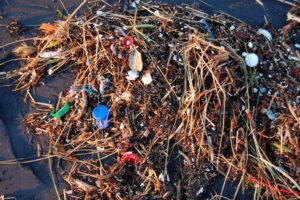Kate Jones is a member of the Socialist Party (CWI in England & Wales).
 “We thought the oceans so vast that nothing we could do would have any effect on them. Now we know this was wrong”. (David Attenborough, Blue Planet II, BBC, 2017) Millions of viewers were enthralled by Blue Planet II, and many who have probably given little, if any, thought to the impact of human society on our oceans, will have had their eyes opened to the warming and acidification of the seas and the scourge of waste plastic, all man-made processes.
Most of us know by now that the earth is experiencing a dramatic change in climate, caused by man-made increases in carbon dioxide and other greenhouse gases. Carbon dioxide is a natural part of the air: plants need it to grow, animals exhale it when they breathe. However, thanks to the burning of fossil fuels and the intensification of agriculture over the last 150-200 years, there is now more CO2 in the atmosphere than at any time in the past 15 million years.
Acidic seas
Rather than remaining in the atmosphere, 30% of the CO2 dissolves into seawater, where chemical changes break it down to form carbonic acid (H2CO3). This is resulting in the acidification of the oceans – sometimes called climate change’s ‘equally evil twin’. Since the beginning of the industrial era, 525 billion tons of carbon have been absorbed into the oceans, and the rate is currently around 22 million tons per day.
In the past 200 years, the oceans have become 30% more acidic – a bigger change to ocean chemistry than any in the last 50 million years. Marine life, which evolved over millions of years, does not have enough time to adapt, and acidification is expected to have dramatic but still largely unknown impacts on ocean ecosystems. Some organisms will survive or may even thrive under the more acidic conditions. Others will struggle to adapt and may even become extinct.
The skeletons and shells of many marine species are especially sensitive to increased acidity. Coral reefs, already weakened by ‘bleaching’, a result of warmer seas, are likely to disappear by the end of the century. Although reefs make up only a small proportion of coasts, they are rich ecosystems, home to a vast number of species of fish and marine invertebrates.
Zooplankton, tiny drifting animals with shells made of calcium carbonate, are at the base of many food chains. They are also critical to the carbon cycle. When they die and sink to the seafloor, their shells are deposited as rock or sediment, an important way that carbon is removed from the atmosphere. Experiments indicate that these tiny organisms suffer from higher acidity, because their shells dissolve rapidly. Some species may be extinct by the end of the century, and some commercial shellfish species are already seeing declines.
A deluge of plastic
It used to be that the only marine pollution which made the news was oil spills affecting our beaches, leaving birds covered in oil. But far more significant is the impact of plastic waste. In Blue Planet, Attenborough showed turtles trapped in plastic bags, an albatross flying hundreds of miles to find food for its sole chick only to end up feeding it plastic, islands of floating waste in the seas, and tiny microplastics that have made their way to every part of the oceans.
Plastic has existed for only 100 years and has been in large-scale use only since the 1960s. A wonder material, it is cheap, light, durable, waterproof, almost impossible to imagine life without it. However, none of the commonly used plastics are biodegradable. Of all the plastic ever produced, 8.3 billion tons of it, the vast majority is still in existence. Half the plastic around today was produced in the last 20 years. Only 9% of discarded plastic is recycled, and generally only once – into more plastic – merely delaying slightly the day when it becomes ‘waste’. Current trends point to 12 billion tonnes of waste by 2050.
Around 30% of plastic waste ends up in the oceans, some floats on the surface creating vast plastic islands, some is washed up on beaches, but it all eventually breaks down into tiny fragments that pervade every part of the seas. Microplastics also result from the use of micro-beads in cosmetic and cleaning products, and from tiny fibres shed during the washing of artificial fabrics. These particles, many so small as to be invisible to the naked eye, are flushed through our drains, sewers and rivers to end up in the ocean.
Every second, 20,000 plastic bottles of drink are sold worldwide. And as global brands like Coca-Cola further penetrate the developing world, this deluge of waste will grow still further, much of it ending up in the oceans. Greenpeace has estimated that Coca-Cola alone pumps out over 110 billion single-use plastic bottles every year.
In a recent about-turn, following years of refusing to take any responsibility for its impact on our planet, Coca-Cola has announced a plan to “recover and recycle all our packaging”. Drinks bottles are indeed 100% recyclable – but only if there are facilities to collect and process them, simply not the case in much of the world. Has Coca-Cola suddenly seen the light? No, it sees good commercial reasons to go down this road, a marketing gimmick it can well afford. But it’s too little, too late.
Micro-beads are now being banned in the USA and Europe. However, no-one demanded these products. Most people had no idea there was plastic in their toothpaste and hand-creams, or that they were washing it down the drain and ultimately into our oceans. It’s there because it’s cheap. Like the coke bottles, it is there purely and simply because of capitalism.
Microplastics absorbed by zooplankton work their way up the food chain. Whales are now being poisoned by toxic chemicals leached from the plastics they have absorbed through their food. Plastic is also being served on the plates of people who eat fish and shellfish. The possible risks to human health are not yet known.
Global action
At the end of Blue Planet II, David Attenborough asked whether it is too late to save our fragile planet. He goes on to outline various very laudable initiatives being taken by individuals and small groups around the world. Yet, for socialists, the answer to this environmental catastrophe is glaringly obvious.
The problem is caused not by individual consumer demand or reluctance to recycle. It is caused 100% by the global capitalist system. There is little or no immediate economic benefit to big business to clean up the oceans, restrict the use of plastic or massively boost recycling. Some governments tinker with regulation, introduce taxes for the use of plastic bags and bottles, or ban the use of microbeads. But Coca-Cola and other multinationals have more economic clout than most governments, especially in the developing world, their biggest growth markets.
Only global action by the working class can bring about real and lasting change. That would mean taking over the multinationals behind the pollution, and reducing climate change and ocean acidification through a global switch to renewables. It would include public ownership of the oil and energy businesses, along with global transport and distribution systems. Only then can we hope to make our planet habitable for us and for the wildlife in our forests, our plains and, yes, our oceans too. Socialism or ecological disaster, the choice has never been starker.
“We thought the oceans so vast that nothing we could do would have any effect on them. Now we know this was wrong”. (David Attenborough, Blue Planet II, BBC, 2017) Millions of viewers were enthralled by Blue Planet II, and many who have probably given little, if any, thought to the impact of human society on our oceans, will have had their eyes opened to the warming and acidification of the seas and the scourge of waste plastic, all man-made processes.
Most of us know by now that the earth is experiencing a dramatic change in climate, caused by man-made increases in carbon dioxide and other greenhouse gases. Carbon dioxide is a natural part of the air: plants need it to grow, animals exhale it when they breathe. However, thanks to the burning of fossil fuels and the intensification of agriculture over the last 150-200 years, there is now more CO2 in the atmosphere than at any time in the past 15 million years.
Acidic seas
Rather than remaining in the atmosphere, 30% of the CO2 dissolves into seawater, where chemical changes break it down to form carbonic acid (H2CO3). This is resulting in the acidification of the oceans – sometimes called climate change’s ‘equally evil twin’. Since the beginning of the industrial era, 525 billion tons of carbon have been absorbed into the oceans, and the rate is currently around 22 million tons per day.
In the past 200 years, the oceans have become 30% more acidic – a bigger change to ocean chemistry than any in the last 50 million years. Marine life, which evolved over millions of years, does not have enough time to adapt, and acidification is expected to have dramatic but still largely unknown impacts on ocean ecosystems. Some organisms will survive or may even thrive under the more acidic conditions. Others will struggle to adapt and may even become extinct.
The skeletons and shells of many marine species are especially sensitive to increased acidity. Coral reefs, already weakened by ‘bleaching’, a result of warmer seas, are likely to disappear by the end of the century. Although reefs make up only a small proportion of coasts, they are rich ecosystems, home to a vast number of species of fish and marine invertebrates.
Zooplankton, tiny drifting animals with shells made of calcium carbonate, are at the base of many food chains. They are also critical to the carbon cycle. When they die and sink to the seafloor, their shells are deposited as rock or sediment, an important way that carbon is removed from the atmosphere. Experiments indicate that these tiny organisms suffer from higher acidity, because their shells dissolve rapidly. Some species may be extinct by the end of the century, and some commercial shellfish species are already seeing declines.
A deluge of plastic
It used to be that the only marine pollution which made the news was oil spills affecting our beaches, leaving birds covered in oil. But far more significant is the impact of plastic waste. In Blue Planet, Attenborough showed turtles trapped in plastic bags, an albatross flying hundreds of miles to find food for its sole chick only to end up feeding it plastic, islands of floating waste in the seas, and tiny microplastics that have made their way to every part of the oceans.
Plastic has existed for only 100 years and has been in large-scale use only since the 1960s. A wonder material, it is cheap, light, durable, waterproof, almost impossible to imagine life without it. However, none of the commonly used plastics are biodegradable. Of all the plastic ever produced, 8.3 billion tons of it, the vast majority is still in existence. Half the plastic around today was produced in the last 20 years. Only 9% of discarded plastic is recycled, and generally only once – into more plastic – merely delaying slightly the day when it becomes ‘waste’. Current trends point to 12 billion tonnes of waste by 2050.
Around 30% of plastic waste ends up in the oceans, some floats on the surface creating vast plastic islands, some is washed up on beaches, but it all eventually breaks down into tiny fragments that pervade every part of the seas. Microplastics also result from the use of micro-beads in cosmetic and cleaning products, and from tiny fibres shed during the washing of artificial fabrics. These particles, many so small as to be invisible to the naked eye, are flushed through our drains, sewers and rivers to end up in the ocean.
Every second, 20,000 plastic bottles of drink are sold worldwide. And as global brands like Coca-Cola further penetrate the developing world, this deluge of waste will grow still further, much of it ending up in the oceans. Greenpeace has estimated that Coca-Cola alone pumps out over 110 billion single-use plastic bottles every year.
In a recent about-turn, following years of refusing to take any responsibility for its impact on our planet, Coca-Cola has announced a plan to “recover and recycle all our packaging”. Drinks bottles are indeed 100% recyclable – but only if there are facilities to collect and process them, simply not the case in much of the world. Has Coca-Cola suddenly seen the light? No, it sees good commercial reasons to go down this road, a marketing gimmick it can well afford. But it’s too little, too late.
Micro-beads are now being banned in the USA and Europe. However, no-one demanded these products. Most people had no idea there was plastic in their toothpaste and hand-creams, or that they were washing it down the drain and ultimately into our oceans. It’s there because it’s cheap. Like the coke bottles, it is there purely and simply because of capitalism.
Microplastics absorbed by zooplankton work their way up the food chain. Whales are now being poisoned by toxic chemicals leached from the plastics they have absorbed through their food. Plastic is also being served on the plates of people who eat fish and shellfish. The possible risks to human health are not yet known.
Global action
At the end of Blue Planet II, David Attenborough asked whether it is too late to save our fragile planet. He goes on to outline various very laudable initiatives being taken by individuals and small groups around the world. Yet, for socialists, the answer to this environmental catastrophe is glaringly obvious.
The problem is caused not by individual consumer demand or reluctance to recycle. It is caused 100% by the global capitalist system. There is little or no immediate economic benefit to big business to clean up the oceans, restrict the use of plastic or massively boost recycling. Some governments tinker with regulation, introduce taxes for the use of plastic bags and bottles, or ban the use of microbeads. But Coca-Cola and other multinationals have more economic clout than most governments, especially in the developing world, their biggest growth markets.
Only global action by the working class can bring about real and lasting change. That would mean taking over the multinationals behind the pollution, and reducing climate change and ocean acidification through a global switch to renewables. It would include public ownership of the oil and energy businesses, along with global transport and distribution systems. Only then can we hope to make our planet habitable for us and for the wildlife in our forests, our plains and, yes, our oceans too. Socialism or ecological disaster, the choice has never been starker. 


